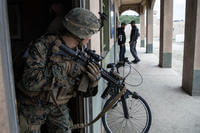Another great decision was brought to us this week by T.S. Ellis, the U.S. District Court judge who is making his own very special legal mark on the Global War on Terror.
In a surprise ruling, Ellis decided that defrauding the Coalition Provisional Authority (CPA), though not such a nice thing to do, wasnt the same as defrauding the U.S. government (presumably thats bad, too).
What? Yes, yes, the word coalition is in the name, but we assumed that was just window dressing, sort of like the Nicaraguans who were part of the Coalition of the Willing.
I guess some people took that coalition stuff seriously.
Lets revisit the case. Custer Battles a Virginia-based security firm with no substantive experience in security, got a lucrative security contract from the CPA. In 2006, they were found to have defrauded the U.S. governmentsomething that didnt come as a surprise to those who worked with them (probably the worst I've seen in my 30 years in the Army" was a memorable quote). The case was prosecuted on the False Claims Act, which allows citizens with insider knowledge of fraud to make claims against these bad-boy companies.
The False Claims Act was expected to be used against a number of companies operating in Iraq, according to the New York Times. Ellis' ruling throws a wrench in those plans, the article says:
But an underlying issue raised by Custer Battles during its trial and on appeal was whether bills submitted to the Coalition Provisional Authority could be regarded as bills presented to the United States government. The coalition authority was an entity created and largely financed by the United States to run Iraq, and largely staffed by American officials, but with an ambiguous legal status.
The Justice Department in an advisory opinion, and the jury in the Custer Battles case, said that some of the Custer Battles invoices were indeed claims against the American treasury and that the False Claims Act applied.
But in an opinion issued Wednesday and posted yesterday, Judge T. S. Ellis III, of the Federal District Court in Alexandria, Va., said the plaintiffs had failed to prove that the claims were presented to the United States. The coalition authority, the judge ruled, was an international entity, and bills presented to American officials then detailed to the authority were not subject to the False Claims Act.
Did we miss something here? Wasnt Paul Bremer, the CPAs head, reporting to the U.S. government? Wasnt the CPA funded and controlled by the U.S. government? Did the United Kingdom really have much of a say (or maybe it was Nicaragua pulling the strings)? The ruling, if upheld, simply makes a bigger mess of U.S. policies in Iraq, particularly as it pertains to private contractors accountability.
What about Judge Ellis? Lets look at some of his other fascinating decisions:
* Earlier this month, Ellis allowed espionage charges to proceed against two former employees of AIPAC, a pro-Israel lobby, to continue. The Federation of American Scientists says this precedent could have radical implications (like for the Federation, which posts a lot of national defense documents).
* In May, the same judge dismissed a lawsuit against the CIA and assorted contractors by German citizen Khalid El-Masri. The judge said the charges of torture, if true, were sad, but national security is national security (of course, I thought national security was about protecting the rights of U.S. citizens and citizens of our allies).
Of course, now Im surprised that Ellis didnt question whether the CIA was actually controlled by the U.S. government.
--Sharon Weinberger (and cross-posted at my new site)







